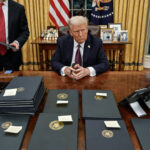From today through Tuesday, the United Methodist Church is holding a special session of their General Convention to determine the denomination’s policy on ordaining practicing homosexuals and blessing same-sex unions. As Dale M. Coulter explains at First Things,
Last July, the Council of Bishops offered three possible plans for moving forward: the One Church Plan, the Connectional Conference Plan, and the Traditional Plan. The One Church Plan calls for removing language from the Book of Discipline that upholds traditional teaching on sexuality, and allowing individual churches and conferences to decide on the basis of conscience whether they will permit same-sex unions or homosexual bishops. The Connectional Conference Plan calls for completely reorganizing the regional conferences around shared beliefs rather than geography—in other words, creating traditionalist and progressive conferences and trying to hold them together. The Modified Traditional Plan calls for upholding the traditional teaching on sexuality and then offering an exit path for any local churches or conferences that disagree.
Next week TGC will report and comment on the outcome of the session. In the meantime, here are nine things you should know about America’s largest mainline denomination.
1. Within the United States, the United Methodist Church (UMC) is the largest mainline denomination, the second-largest Protestant denomination (after the Southern Baptist Convention), and the third-largest Christian denomination. As of 2016 (the last year for which statistics are available), the UMC has within the United States 6.9 million lay members, 44,080 clergy, and 31,867 local churches.
2. The UMC is part of the Methodist movement, which began in the 1700s in England under Anglican minister John Wesley and his followers. Wesley and his brother Charles brought the movement to the colony of Georgia, arriving in March 1736 as Church of England missionaries. The U.S. Methodist Episcopal Church was organized in 1784. A split in 1828 formed the Methodist Protestant Church, and in 1844, over the issue of slavery, the Methodist Episcopal Church, South. The North and South factions reunited in 1939 (as The Methodist Church), but retained racial segregation. That separation ended in 1968 with the merger of the Methodist and Evangelical United Brethren Churches.
3. The UMC’s polity is based on connectionalism, a term that dates back to the founding of Methodism. According to connectionalism, David W. Scott says, the church is defined not by formal structures or doctrine or lines of authority—connections between pastor and pastor, between pastor and laity, and between laity and laity. As a connectional church, the UMC hold such interpersonal connections to be the essence of the church. (Connectionalism can be contrasted with congregationalism, a form of polity that considers the highest authority to be the local congregation.)
4. Within the connectional structure, the UMC’s primary grouping of people and churches is the conference. (The term conference refers to both the “assembly and organization of people” as well as the “process of discerning God’s call together.”) Groups of local churches in a geographic area are organized to form a district, which in turn are connected to annual (regional) conferences. Regional conferences in the United States are divided into five areas known as jurisdictions: Northeastern, Southeastern, North Central, South Central, and Western. The jurisdictional conferences around the globe are also connected to the General Conference.
5. The General Conference is an international body of nearly 1,000 delegates that generally meets every four years. Comprising delegates elected by annual gatherings of regional conferences, it is the only body that can set official policy and speak for the denomination. Half of the delegates are clergy, and half are laity (non-clergy members). Bishops attend the General Conference and can serve as presiding officers but cannot vote. During the General Conference, delegates discuss and vote on petitions, resolutions, and other actions that will result in a revision of the Book of Discipline. General Conferences are generally held in years divisible by 4, such as 2008, 2012, 2016, and so on, with the exception of special sessions.
6. The foundational documents of the UMC include the Apostles’ Creed, the Articles of Religion of The Methodist Church, and the Confessions of Faith of The Evangelical United Brethren Church. These documents, along with Wesley’s Sermons on Several Occasions and Explanatory Notes Upon the New Testament, are considered standards of doctrine for United Methodists. The “Social Principles,” included in the Book of Discipline, is the denomination’s basic statement of convictions about their fundamental relationships between God, God’s creation, and humanity. While not considered church law, the Social Principles serve as a guide to official church action and individual witness, and are a “prayerful and thoughtful effort on the part of the General Conference to speak to the human issues in the contemporary world from a sound biblical and theological foundation as historically demonstrated in United Methodist traditions.”
7. The laws, doctrine, administration, organizational work, and procedures of the UMC are collected in the Book of Discipline, a document published every four years following the meeting of the General Conference. The Book of Discipline is the instrument for setting forth the laws, plan, polity, and process by which United Methodists govern themselves. Each General Conference “amends, perfects, clarifies, and adds its own contribution” to the Discipline. The UMC Council of Bishops says the Discipline is “considered to all in our constituency and to friends beyond our bounds who would seek to understand what it means to be a United Methodist.”
8. Within the UMC, clergy are individuals who serve as commissioned ministers, deacons, elders, and local pastors under appointment of an elder (ordained minister) who has been elected to the office of bishop. The United Methodist Church has 46 active bishops in the United States (including 16 women) and 20 active bishops in Africa, Europe, and the Philippines. Bishops in the United States are elected every four years and serve until retirement. Each bishop supervises a specific geographical area of the church and annually appoints all ordained ministers in that area. The Council of Bishops supervises and promotes the temporal and spiritual interests of the denomination.
9. The UMC, considered one of the “Seven Sisters of American Protestantism,” is a member of the National Council of the Churches of Christ in the United States of America and of the World Council of Churches. It also participates in Churches Uniting in Christ (formerly the Consultation on Church Union). The UMC also has full communion agreements with the Evangelical Lutheran Church in America, the United Church of Sweden, the Moravian Church, the African Methodist Episcopal Church, the African Methodist Episcopal Church Zion, the Christian Methodist Episcopal Church, the African Union Methodist Protestant Church, and the Union American Methodist Episcopal Church. They also have an “Interim Eucharistic Sharing Agreement” with The Episcopal Church, pending approval of a full communion agreement by both denominations (projected for The UMC General Conference 2020 and TEC General Convention 2021). (Full communion agreements means they recognize in each other’s churches that “the gospel is rightly preached, the sacraments are duly administered, and the ministry of the clergy is ordered in such a way as to allow for the orderly exchange of some ordained clergy among us.”)
“The Most Practical and Engaging Book on Christian Living Apart from the Bible”
 “If you’re going to read just one book on Christian living and how the gospel can be applied in your life, let this be your book.”—Elisa dos Santos, Amazon reviewer.
“If you’re going to read just one book on Christian living and how the gospel can be applied in your life, let this be your book.”—Elisa dos Santos, Amazon reviewer.
In this book, seasoned church planter Jeff Vanderstelt argues that you need to become “gospel fluent”—to think about your life through the truth of the gospel and rehearse it to yourself and others.
We’re delighted to offer the Gospel Fluency: Speaking the Truths of Jesus into the Everyday Stuff of Life ebook (Crossway) to you for FREE today. Click this link to get instant access to a resource that will help you apply the gospel more confidently to every area of your life.

































